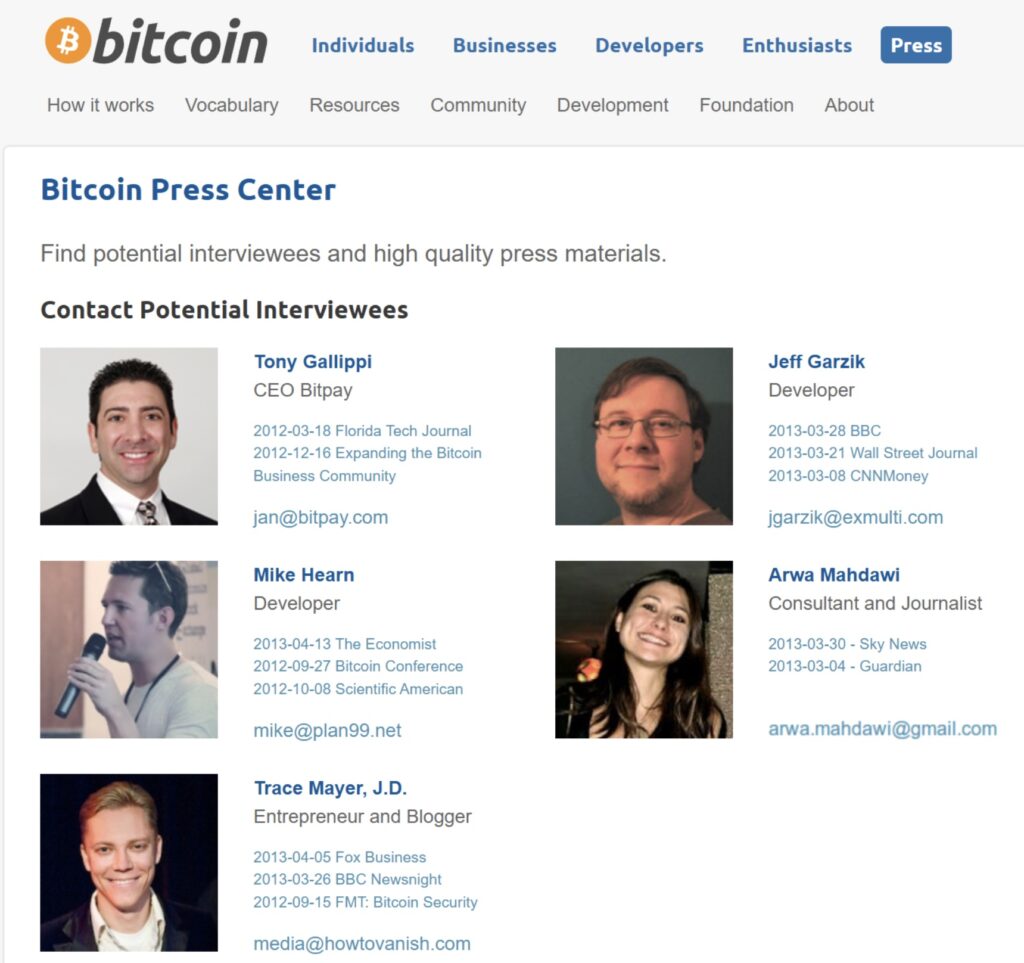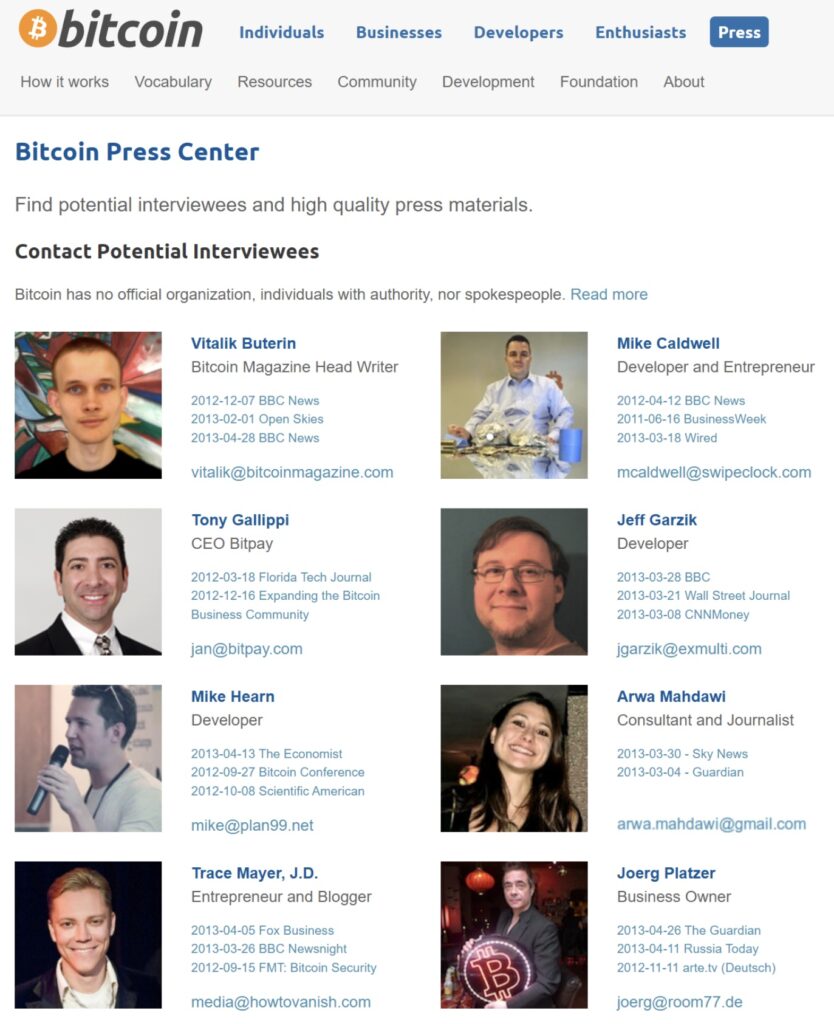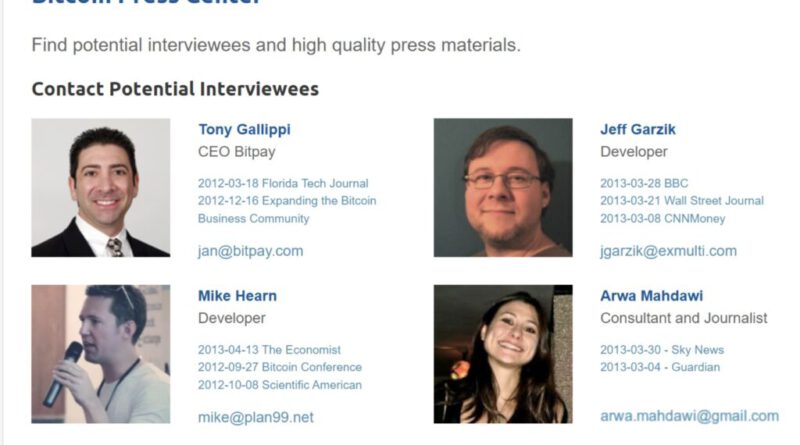The Bitcoin Press Center
Abstract: In this piece on Bitcoin history, we go back to 2013 and we cover the short lived “Bitcoin Press Center” on the Bitcoin.org website. It was decided that there should be a list of people on the press center page, a potential quasi official list of Bitcoin media contacts. We examine the inevitable arguments over who should and should not be on the list and the interrelationship between who should go on the list and the wider battle over Bitcoin culture. Should Bitcoin be an underground rebel currency or should it go mainstream and appeal to the moderate masses?

Source: https://web.archive.org/web/20130421032409/http://bitcoin.org:80/en/bitcoin-for-press
Overview
In another part of our series into Bitcoin history, this time we go back to April 2013. We have previously covered topics such as:
- The 2011 Bitcoin flash crash
- The London 2012 Bitcoin Conference
- Satoshi’s 2014 Email Hack
- The 2014 OP_Return Wars
In this article we cover an April 2013 argument over a list of media contacts on the Bitcoin.org website, on a page called the “The Bitcoin Press Center”. This topic can be thought of as somewhat inconsequential, however it touches on wider cultural Bitcoin issues, such as what is Bitcoin for, which growth strategy to adopt and who are the Bitcoiners. Therefore, we consider it a significant enough topic to write about almost 12 years later.
On 22 March 2013, former prominent Bitcoin developer Mike Hearn posted on the BitcoinTalk forum about the idea for a “Bitcoin Press Center” page on the Bitcoin.org website and he asked for volunteers to put themselves forward as potential candidates as press contacts. That way if a journalist wanted to write about Bitcoin, they could Google Bitcoin, discover this page and then find someone to talk to, with their contact details. As Mike put it:
Over the last few years many of us have been amazed by the variable quality of Bitcoin press coverage. Some journalists really understand what this is all about and go deep, others simply regurgitate whatever was already written or seem to deliberately search for a negative spin. This has not been especially surprising to me, because in my time working at a large software company I’ve seen how press stories get written. There is a really strong reason why all large corporations have a dedicated team of PR staff, and it’s because helping journalists write good stories is a full time job. In this case by “good” I mean, accurate and balanced, not necessarily product-pimping positive fluff. Bitcoin does not have any dedicated PR people, nor should it. But we can do the next best thing by providing a really good self-serve press center on the website.
Source: https://bitcointalk.org/index.php?topic=156364.0;all
Just under a month later, on 16 April 2013, a related pull request on GitHub was made and a press center page was proposed. Several names were put up as media contacts, two of which seemed to cause a degree of controversy. Mr Roger Ver and Mr Jon Matonis. Some Bitcoin developers suggested these were inappropriate candidates for this position, for somewhat controversial/political reasons, and therefore they were not added to the website list. It now seems inevitable that such an exclusive short list would cause heated and unproductive arguments and potentially offend some people. The issues became personal pretty fast, which can be somewhat expected when discussing a list of people who could best represent Bitcoin. These discussions often touched on wider philosophical issues about Bitcoin and Bitcoin’s public perception.
The Pull Request Debate
The first to raise concerns about the press contacts was Bitcoin developer Luke-Jr, who quickly referred to Jon Matonis as an “extremist anarchist”. Another Bitcoin developer, Jeff Garzik then chimed in, supporting Luke’-Jr’s position:
Matonis goes too far in openly advocating illegal behavior like tax evasion. Roger Ver used to give interviews to places like the Daily Anarchist, though I think some of that is toned down now.
Source: https://github.com/bitcoin-dot-org/Bitcoin.org/pull/139#issuecomment-16426114
A third developer, Mr Greg Maxwell also agreed with Luke and Jeff:
I too am highly concerned about the inclusion of Mr. Matonis here. I am very happy that Bitcoin attracts people with many political and philosophical backgrounds, including those I disagree with, but I think people who speak for Bitcoin should be ones who can put those views aside. This is particularly the case when they view Bitcoin as being at odds with the laws and norms of major nations.
While I am delighted that Bitcoin is a big enough tent to include such diversity, I think the names we extend as press contacts should tend to be politically moderate. We want and need diversity of all kinds for Bitcoin to be a success, extolling one kind of political understanding of Bitcoin excludes others. Doubly so when the position is one that some would perceive as at odds with upright and lawful behavior
Source: https://github.com/bitcoin-dot-org/Bitcoin.org/pull/139#issuecomment-16429652
The comments from Luke-Jr, Jeff Garzik and Greg Maxwell were effective, and a decision was made to remove Roger Ver and John Matonis from the list. Others, such as Bitcoin developer Patrick Strateman also agreed.
NACK felons should not be on the press page
Source: https://github.com/bitcoin-dot-org/Bitcoin.org/pull/139#issuecomment-16429672
This felon statement was referring to Roger Ver’s criminal conviction in the United States for selling explosives on eBay. As one can imagine, although such a list is largely inconsequential and meaningless, Roger Ver himself and many others were not happy about how and why he was excluded from the list. Roger Ver himself chimed into the discussion:
I’m confident I am one of the best spokesmen for bitcoin in the world, and the masses on the forums, and in person clearly agree.
Source: https://github.com/bitcoin-dot-org/Bitcoin.org/pull/139#issuecomment-16435555
Luke-Jr then responded:
Roger Ver, surely you can see how the media would be able to easily spin your past as “Roger Ver, spokesperson for Bitcoin, holds a conviction for selling explosives to terrorists” or something along those lines? Your response here ignoring the conviction entirely suggests (perhaps I am reading too much into it) that you might still disagree that what you did there was wrong – and for all I know, maybe you’re right about that – which isn’t going to help if you’re put on the defensive about it either. If you give them a response like it is “more proof that the Government is an immoral, violent organization that should not be supported in any way”, surely you can see this would work against Bitcoin?
Source: https://github.com/bitcoin-dot-org/Bitcoin.org/pull/139#issuecomment-16440473
The Bitcoin.org website developer who made the pull request then entered the debate, trying to calm things down:
Roger Ver, actually this is not about your ability to represent Bitcoin. So far from what I’ve seen (but I didn’t see a ton of interviews), you are [energetic] and you seem to provide accurate and relevant answers. But the press have no pity and you have a very bad label that they can turn against you and Bitcoin as a whole. No matter what are your skills, they won’t let you defend yourself and you (we) will have no recourse. I’m also kind of disappointed that it works this way, but that is how it works. I’m sure that you want to help, but I’m not sure that you can help in that position. Regardless of how frustrating that might be. Not that you can’t make good interviews and help Bitcoin on your own, it’s only about associating your name (and your past) with what will look “official” to the eyes of the people.
Source: https://github.com/bitcoin-dot-org/Bitcoin.org/pull/139#issuecomment-16464502
Many people seemed somewhat outraged and highly sceptical of the fact that Roger had been excluded from this list because of his politics or criminal record. It is somewhat ironic, because if Roger had never been proposed in the first place nobody would have cared or perhaps even ever seen the list. Nevertheless, now Roger was excluded, there was some anger at the decision. Erik Voorhees expressed the outrage as follows:
When I heard about this yesterday, I thought it was a joke. It is appalling that Roger Ver and Jon Matonis, two of the most professional and eloquent public proponents of Bitcoin, would be removed from a press list, merely because they don’t cater their discussion to the lowest common denominator of public perception. Yes, some out there would be turned off by their ideology. Yes, some press might try to target them personally and thus tarnish Bitcoin’s reputation. So what. Bitcoin is not so weak and pathetic that it requires only tacit, cowed spokesmen who are more like politicians than real individuals with passion and ideology and, importantly, the character to stand up for that in which they believe. Bitcoin is not so fragile that it can only be advanced by grovelling to the very people who built the terrible systems it seeks to replace. It is embarrassing to see Bitcoin reduced to sniveling permission-seekers, too cowardly to speak about the real issues and the real reasons why this technology is so important. There is not a global, passion-driven community around Bitcoin because it offers lower money transfer fees. We do this because of what Bitcoin means on a philosophical and societal level, and Roger and Jon are two of the best at conveying this sentiment in a professional, non-confrontational, level-headed manner. And now they’ve been censored. Bitcoin is a movement, and those trying to distil it into nothing more than a cute new technology are kidding themselves and doing a terrible disservice to this community. If you want to sell pre-packaged, politically correct PR, go work for Dwolla.
Source: https://github.com/bitcoin-dot-org/Bitcoin.org/pull/139#issuecomment-16746792
Mark Lamb, who at the time was CEO of the UK Bitcoin exchange Coinfloor, agreed with Erik:
This is disgusting. Bitcoin is not a hierarchical organisation. It is not a company or formal organisation at all in fact. The idea that anyone here, anyone working on bitcoin, could think to censor someone because of their radical ideas – that is completely ridiculous. Bitcoin is a censorship free protocol, an open P2P network and does not have leaders or authority that can attempt to hush/censor people. If you think that it is a good idea to not include someone on the PR list because of their extreme ideas, then I would hold that your ideology is inconsistent with the philosophy that was written directly into the code of bitcoin. Furthermore, this position is also inconsistent with the community that makes up bitcoin. It’s estimated that a sizeable (33% or more) portion of the bitcointalk users and bitcoin users in general are libertarians and anarcho-capitalists.
Source: https://github.com/bitcoin-dot-org/Bitcoin.org/pull/139#issuecomment-16750756
BitcoinTalk Forum Debate
The pull request on GitHub was merged and the Bitcoin Press Page then went live, without Mr Ver and Mr Matonis. The debate then moved over to BitcoinTalk, with Roger Ver defending his position:
What I’m advocating isn’t extreme. The governmental systems we have today, that murder hundreds of millions of innocents, drop nuclear bombs, enforce sanctions, extort money under the threat of violence, control capital flow, debase currencies, and retard the overall rate of economic growth, causing everyone to be poorer than they otherwise would have been, is extreme. Whether or not I end up listed on the press page, with every waking moment, I will continue to promote Bitcoin and the voluntary world it will help to bring us closer to. My philosophy aside, I do think it is clear that I’m great at promoting Bitcoin. I also think that the following people should also be added to the press page: Jon Matonis, Erik Voorhees, Jeff Berwick. Bitcoin is about inclusion, not exclusion.
Source: https://bitcointalk.org/index.php?topic=181168.msg1893085#msg1893085
The discussion then raged on, with people questioning whether there should be such a list at all. Cypherdoc said:
I think the list should be abandoned.
While another user implied the press center page was potentially counterproductive saying:
If you’re not careful, this stupid controversy will become the story instead of the actual technology and its implications. Headlines: “bitcoiners split between libertarian and ‘mainstream’ factions”.
Trace Mayer, who was one of the non-controversial media contacts on the list, joined the debate, on the side of Mr Ver and Mr Matonis:
Three long-standing and respected developers desire to introduce a political ideology test when deciding who should be included in the Press Contacts list as Potential Interviewees. Why that type of political ideology test would be relevant or desired has not been explained or articulated but appears to basically be an appeal to emotion. Much less how any political ideology test should be applied. And if there is consensus that we should use a political ideology test then what type of a test and why? For example, should we use mainstream political opinions in Africa, Pakistan, the United States or Argentina? Why?
Source: https://bitcointalk.org/index.php?topic=181168.msg1895322#msg1895322
Luke-Jr then responded:
No, the problem (in this case) is not their political ideas. The problem is that they project their political ideas on Bitcoin, with things such as representing Bitcoin as being a tool used to bring about anarchy. Matonis, at least, seems to be encouraging people to break the law almost every time he talks about Bitcoin. While I did include Roger Ver in my original objection, it was pointed out that he has (at least lately) kept his politics separate in public – so I’ve limited my objection in this reason to just Matonis. The general objection against Roger Ver is that he has a criminal history. And not just some debatable crime (eg, drug-related or statutory), but selling explosives
Source: https://bitcointalk.org/index.php?topic=181168.msg1896810#msg1896810
Another user took issue with Luke’s “ they project their political ideas on Bitcoin” line, responding:
So do you
Luke-Jr then responded with one of his famous and somewhat ludicrous/comical quotes:
On the contrary. While it is true that my interest in Bitcoin is for the purpose of furthering the Tonal system, I don’t pretend that Bitcoin’s reason for existence is to promote Tonal.
Many other users argued in favour of Bitcoin’s rebellious, revolutionist and anarchist roots, claiming that: “Every revolution is illegal.”
Luke-Jr denied this, claiming:
But Bitcoin is not a political revolution.
The eventual Ethereum and Cardano founder Charles Hoskinson, then entered the debate:
You might want to think a little more deeply about what the bitcoin implies. Currently money is well regulated and controlled by a cabal of secret bankers who are accountable to no one. All monies are inflationary and fiat. The Bitcoin is nearly the polar opposite of the world’s money system. If it succeeds, then it will have an enormous impact on the credibility and faith in central banks. Gunpowder was an incredible scientific accomplishment, but it’s real impact was forever changing war. The Bitcoin will forever change money if it succeeds.
Bitcoin developer Gavin Andresen even chimed into the discussion, seemingly in favour of Ver and Matonis, while opposing Luke.
I think a diversity of views is good, as long as the people expressing their views are honest, trustworthy, and respectable. I still think Luke causes more trouble and strife than he is worth. And I wish people would stop implying he is part of the core development team.
Source: https://bitcointalk.org/index.php?topic=181168.msg1897036#msg1897036
It is important to note that as far as we can tell, Gavin Andresen was the ultimate decision maker at the time with respect to who went on the website list, since Gavin was the ultimate owner of the repository on GitHub, he may have sub-delegated this section to somebody else, who decided not to include Ver and Matonis, but Gavin could have revoked the privileges of this web developer if he wanted, based on our incomplete understanding over how GitHub accounts work. Although the ultimate ultimate authority on the matter was the owner of the Bitcoin.org domain, which at the time was Sirius (Martti Malmi). This eventually somehow appeared to pass on to Cobra, an anonymous individual who was eventually sued by Craig Wright. On 1 May 2013, Sirius did express his view, but he never enforced it on others.
it’s unjust to hand-pick a small group of “bitcoin representatives” for the press page. The bitcoin-press mailing list is not very democratic or transparent either. I vote for removing it.
Source: https://bitcointalk.org/index.php?topic=181168.msg1996365#msg1996365
Andreas Antonopolous
Nobody appeared to be more angered about the media list saga than Mr Andreas Antonopolous. Communicating Bitcoin to a wider audience was clearly an important topic to Antonopolous and he quickly emerged as perhaps the best speaker on Bitcoin in the world, proving to be very engaging, inspirational and passionate when talking about Bitcoin. Andreas must have known a lot about how to communicate about Bitcoin and was therefore frustrated about what he perceived as poor decisions with regards to excluding Mr Matonis and Mr Ver from this list. On 26 April 2013, Andreas Antonopolous added a new pull request to GitHub, wanting to add more people to the Press Center page “starting with Jon Matonis”. The same Bitcoin developers opposed this again, with Greg Maxwell wanting “moderate voices”. Andreas Antonopolous retorted with:
We need more diversity of opinion, not a narrow set that fits someone’s idea of what is politically appropriate.
Andreas continued:
Can we now move towards achieving the goal of expanding the list to include a greater diversity of geographies, languages, experiences and ideas, as proclaimed in this page? I believe that your comments were heard. Some agreed, some did not. The overwhelming consensus as I see it above is to add Matonis. I see two objections and seven positive endorsements not counting mine. I believe that settles the issue of community vetting for Matonis.
Andreas also tried to arrange votes about adding more candidates to the list, polls which he said he won (17 to 7) yet the results were not implemented by the website developers. After a few days, on 26th April 2013, Andreas appeared to lose patience with the process:
We’re past adding Matonis, Ver or anyone else through this process. Even if they were added, the entire process has lost all credibility (didn’t have much to start with) and the developers involved have [shown] themselves to be without any scruples when it comes to respecting the “process” they made up (and made up again and again as needed). Even if one or two candidates were added now, the damage has been done – the Press Center is a list that should be determined as broadly as possible, with as much input from the community and as little exclusion as possible. None of those things are possible within this process any longer. It has been shown to be a complete joke. It’s also not ok to keep the existing list. Every single one of them has been tainted, not of their own fault, but by the inconsistencies exhibited by the decision process.
Source: https://github.com/bitcoin-dot-org/Bitcoin.org/pull/162#issuecomment-17150513
Andreas accused the developers of “playing a power grab of bitcoin.org”. Many agreed with Andreas, after all this was not a technical issue, but a seemingly political one, therefore many expressed the view that this was not a decision for the developers. In addition to the above, Andreas supposedly typed the following message to Greg Maxwell:
GO fuck yourself you little weasel. You have no shame, no integrity and no balls. You can’t even handle a public discussion without getting some sycophant to shut it down when you’re losing. FUCK YOU and suck on a cactus.
Source: https://bitcointalk.org/index.php?topic=181168.msg1973254#msg1973254
On 2 May 2013, Andreas announced that he would launch a new website, bitcoinpresscenter.org, aimed at solving the problem.
I would appreciate help and beta testers for the bitcoinpresscenter.org which I am building as the inclusive alternative to the existing site. It will have only one purpose: to provide a comprehensive list of resources, packaged for press consumption (short bios, multi-res photos, attribution text, etc). There is a way to fix this constructively and put the mess behind us. The press center I envision will have dozens of spokespeople with varying areas of expertise, a variety of roles in the community, a variety of spoken languages and a broad array of opinions. Nominations will be open and public. Votes and endorsements will be open and public.
Source: https://bitcointalk.org/index.php?topic=181168.msg2002317#msg2002317
Conclusion
By July 2013, the discussion had finally mostly come to an end. Mike Hearn claimed the Press Center was a success, stating the following:
Despite all the controversy over how the list of people there is managed, with the benefit of several months of hindsight I think the press center has been a very useful thing. I have no regrets about starting it. The press do use it and we’ve been able to improve the quality of a lot of Bitcoin stories. The one I’m happiest about was a CNN story that started out as “Bitcoin block chain used for hosting child porn” and we successfully worked with the journalist involved such that when it finally went out, the reference to child porn was buried in the last paragraphs and the overall story was a lot more neutral and balanced. Just last week Jeff and I were teaching a journalist who works for the Financial Times about proof of work and why Bitcoin is designed the way it is. We’ve come a long way from the bad old 2011 days.
Source: https://bitcointalk.org/index.php?topic=181168.msg2684368#msg2684368
In the following months, a few more names were added as media contacts. Vitalik Buterin, who later went on to found Ethereum, was made the primary press contact a few months after this saga.

Note: Felix Moreno de la Cova also made it onto the list for a short period of time
By January 2014, after only around seven months, the press center page was taken down, as Sirius had previously suggested. On the webpage the Bitcoin.org website then recommended going to the Bitcoin Foundation if one had questions. Andreas’s website was also listed as a recommendation, this had a much longer list of Bitcoin press contacts. As far as we can tell, there were over 50 press contacts or “Bitcoin experts”, with a focus on providing media contacts across multiple languages. This was probably a much better outcome. This was more decentralised as there were no longer a small list specific individuals listed on the Bitcoin.org site. It also meant there was no exclusive list to argue about. Had the list remained up, it is easy to imagine years of unproductive debates and trolling over who should be on such a list. It was an interesting experiment and we quickly had the results, it was a bad idea for Bitcoin. However, the bitcoinpresscenter.org website never gained significant traction as far as we can tell. Today, journalists probably do not have a problem of finding Bitcoin experts and one centralised list was never going to be a scalable solution to help journaliusts find the “real experts”.
It may seem that writing about such a trivial matter, which happened many years ago, when respected people maybe lost their cool a bit, might be a waste of time. This could be true, but on the other hand this might be a little part of the wider Bitcoin story. The short story of the Press Center being part of Bitcoin.org can be thought of as a similar story to that of the Bitcoin Foundation. It was too centralised, it resulted in too many arguments and scandals. In Bitcoin such a centralised system could not work and it was abolished or became irrelevant, in an undignified mess. Bitcoin itself however, lived on.
The post The Bitcoin Press Center appeared first on BitMEX Blog.
BitMEX Blog




















